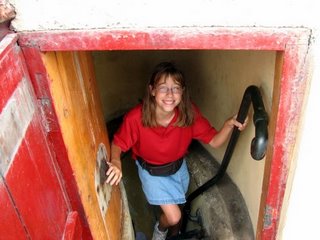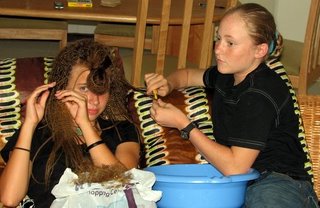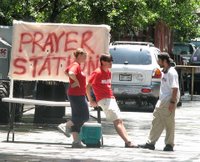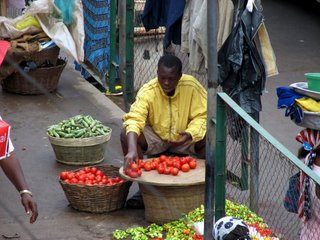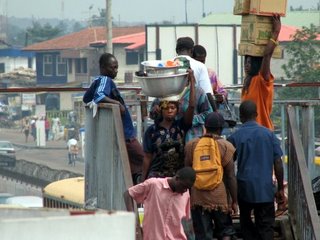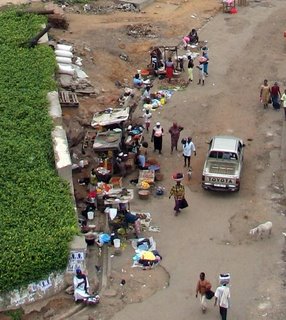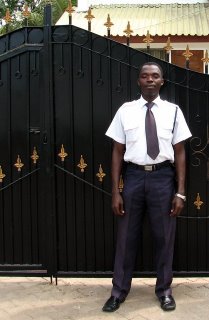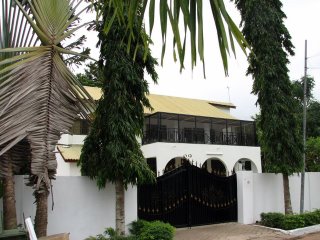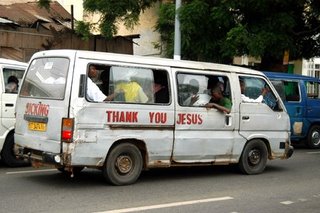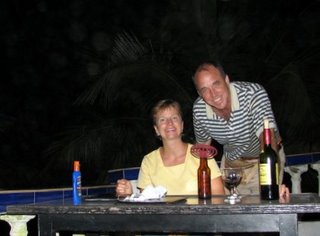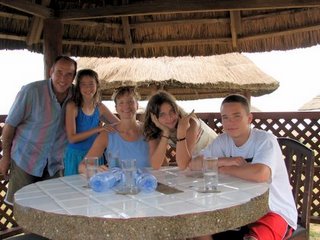Taxis, Tro Tros, and a Patrol
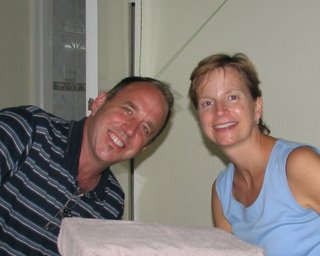 Last night, as we were celebrating my 47th birthday, and the one Suzanne had missed because we were in transit, it occurred to me, as we had spent considerable expense and time putting together Texas style “breakfast tacos” with fried potatoes, refried beans, bacon, eggs, and sausage, I marveled how hard we work to keep the comfort foods of home. I especially see this in the longer term expat families here. It is like there is this American bubble of life that people try to live within, or at least go to when we're all together.
Last night, as we were celebrating my 47th birthday, and the one Suzanne had missed because we were in transit, it occurred to me, as we had spent considerable expense and time putting together Texas style “breakfast tacos” with fried potatoes, refried beans, bacon, eggs, and sausage, I marveled how hard we work to keep the comfort foods of home. I especially see this in the longer term expat families here. It is like there is this American bubble of life that people try to live within, or at least go to when we're all together. I think for the more long term folks, this is understandable, because they want to never lose the uniquely American viewpoint that is their birthright. But for us short-timers, I wonder if we are squandering a once in a lifetime opportunity to interact with the local culture. I remember this same struggle when I was here as a kid, which when you think about it must have been significant to enter the radar zone of a nine year old boy. The struggle then was, as it is now, how much to we inculturate? In 1969, we had very little contact with the other Americans here.
Another thing I noticed then, and I still see here is when we run into other whites, or obrunies in the market place. I go through the market place connecting with Ghanaians, looking at them in the eyes, and smiling. It is the Ghanaian way, but I almost never can make eye contact with the other obrunies, they pretend like I don’t exist, or am ruining the self made fantasy that they are the only white person around.
At first I thought that maybe this was just how unknown elements of a subculture interact, but then I thought maybe I had just forgotten that this is just how people are in the US, or Europe. On the city streets they don’t look you in the eyes, or reach out through a smile. People go through the city avoiding each other, especially their eyes and maybe what I took to be “pretending I wasn’t there” was just a normal mode interaction, or really non-interaction. So I’ve taken to watching other obrunies hard in the eyes as they approach on the street, and saying “Hello” even when it is clearly not welcome.
Chapter Four
Today begins a fourth chapter of our life here. The first was at the resort where all our needs were taken care of, the second is when we moved to the apartment and had to negotiate taxis and walking. Chapter three began with moving into our house and adding the Tro Tros as our primary means of transport, and today begins a four month experiment with a vehicle.
[Keneshe Market Tro Tro and Bus - CENTER]
Tro Tros are best described, as “pretty much any passenger vehicle that isn’t a bus or a taxi.” These battered heavily modified mini-buses, run fixed routes within the city and throughout Ghana, and seem to be the backbone of its transportation system. I can’t think of an American equivalent, the nearest being the subway, but Tro Tros are different because they are not operated by the city or state…they are run by the owners, drivers and mates.
Tro Tro stops are easily identified as any place where a number of Ghanaians are standing by the side of the road looking expectantly. Soon a minibus will speed toward them with a young man hanging out the side, or shouting out the window something like “ACCRA, ‘CRA, ‘CRA, ‘CRA” which tells you its going to Accra Central, what we would call downtown.
 The Mate – This is the man you will have the most interaction with. He’ll answer questions, make change (if you want to buy something at a traffic light), tell people where to sit, and say mostly two phrases, beside the destination: “Away” alerting the driver he may leave, and “Next Stop” except it sounds to me more like he is saying ‘blastoff” which when I think about it would be more appropriate for the word Away, as the Tro Tros, do take off quickly. The Mate also collects the fare, which changes depending on where you get on and where you say you are getting off. They seems to operate on the honor system, the Mate asks you where you are going, and then tells you the fare.
The Mate – This is the man you will have the most interaction with. He’ll answer questions, make change (if you want to buy something at a traffic light), tell people where to sit, and say mostly two phrases, beside the destination: “Away” alerting the driver he may leave, and “Next Stop” except it sounds to me more like he is saying ‘blastoff” which when I think about it would be more appropriate for the word Away, as the Tro Tros, do take off quickly. The Mate also collects the fare, which changes depending on where you get on and where you say you are getting off. They seems to operate on the honor system, the Mate asks you where you are going, and then tells you the fare. The Driver – This man is very skilled in the negotiation of traffic, and works with the Mate to announce the destination. He uses the fingers of his left hand to point. For example going into Accra central, he will point upward, in the direction they are heading. Now this is similar to sign for 37 (another route), but in the opposite direction. For my Tro Tro home, one points backward to the side of their head while facing the road. The Mate will point to the right of the road with his index finger. These signs are subtle, and took me several weeks to begin to recognize them. Announcing the destinations, should help but over time these names have taken on unique and puzzling pronunciations, for example on the Osu Tro Tro, the Mate shouts Osu, Osu, O’ sorry,” and as a Texas Longhorn, I know he is apologizing for naming a place after Oklahoma State University (OSU).
The Owner – This person owns the Tro Tro and splits the take 50/50 with driver and Mate once the cost of petrol is deducted.
 Riding the Tro Tro is always an adventure. Last week I sat next to a army officer who was carrying a loaded AK-47. I asked him about in and learned all sorts of things about that assault rifle. When there is no one who feels like talking, I count how many are on board. The record is 26. I shared this number with Emmanuel, our guard, and he seemed dubious. I explained in the twin seat in front of me there were five people, a mother, a baby strapped to her back, and two elementary age children, plus a man unrelated to them. He said “Ah! We don’t count the children!” Waiting for the Tro Tro to fill later, I saw on the side of the minibus the hand painted certificate of occupancy: 19 maximum.
Riding the Tro Tro is always an adventure. Last week I sat next to a army officer who was carrying a loaded AK-47. I asked him about in and learned all sorts of things about that assault rifle. When there is no one who feels like talking, I count how many are on board. The record is 26. I shared this number with Emmanuel, our guard, and he seemed dubious. I explained in the twin seat in front of me there were five people, a mother, a baby strapped to her back, and two elementary age children, plus a man unrelated to them. He said “Ah! We don’t count the children!” Waiting for the Tro Tro to fill later, I saw on the side of the minibus the hand painted certificate of occupancy: 19 maximum. 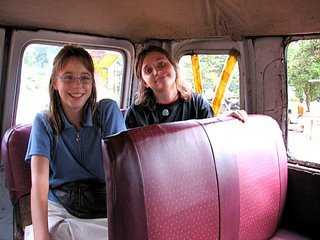 A friend from school of Grace’s was driving about with her parents and telling them about this new girl from Texas. “She a bit different, and quite adventuresome,” she said. “In fact there she is,” and pointing to Grace as she climbed out of Tro Tro. She had been here years and never ridden a Tro Tro.
A friend from school of Grace’s was driving about with her parents and telling them about this new girl from Texas. “She a bit different, and quite adventuresome,” she said. “In fact there she is,” and pointing to Grace as she climbed out of Tro Tro. She had been here years and never ridden a Tro Tro. Among the expats here, they seem to be divided by the question “Do you Tro Tro?” Some do, some don’t, and today we begin having a fourth option: to drive. We are taking care of a diesel Nissan Patrol, while missionaries Rev. Andrew and Dr. Juliana Jernigan [read their blog] or [see their webpage] head to Liverpool for a four month certification in Tropical Medicine. Andrew and Ju hope that the Lake Bosumtwe Methodist Clinic can become "a means where we can share healing and hope, physical and spiritual". Juliana needed additional training to be more effective in their mission. Andrew gave us the insiders tour of Accra a few weeks back just before we moved, and either showed us or told us about all the places to outfit a house. It is God’s “Just in Time” way, to give you the information you need, right before you need it. I wonder how God will use this vehicle in our lives, at the coincidence of it arriving on the evening of my 47th birthday. It feels like a gift, unearned, undeserved, but oh so nice to have. I look forward to discovering its purpose in our life here.
[click here to see more birthday and Tro Tro pictures]

